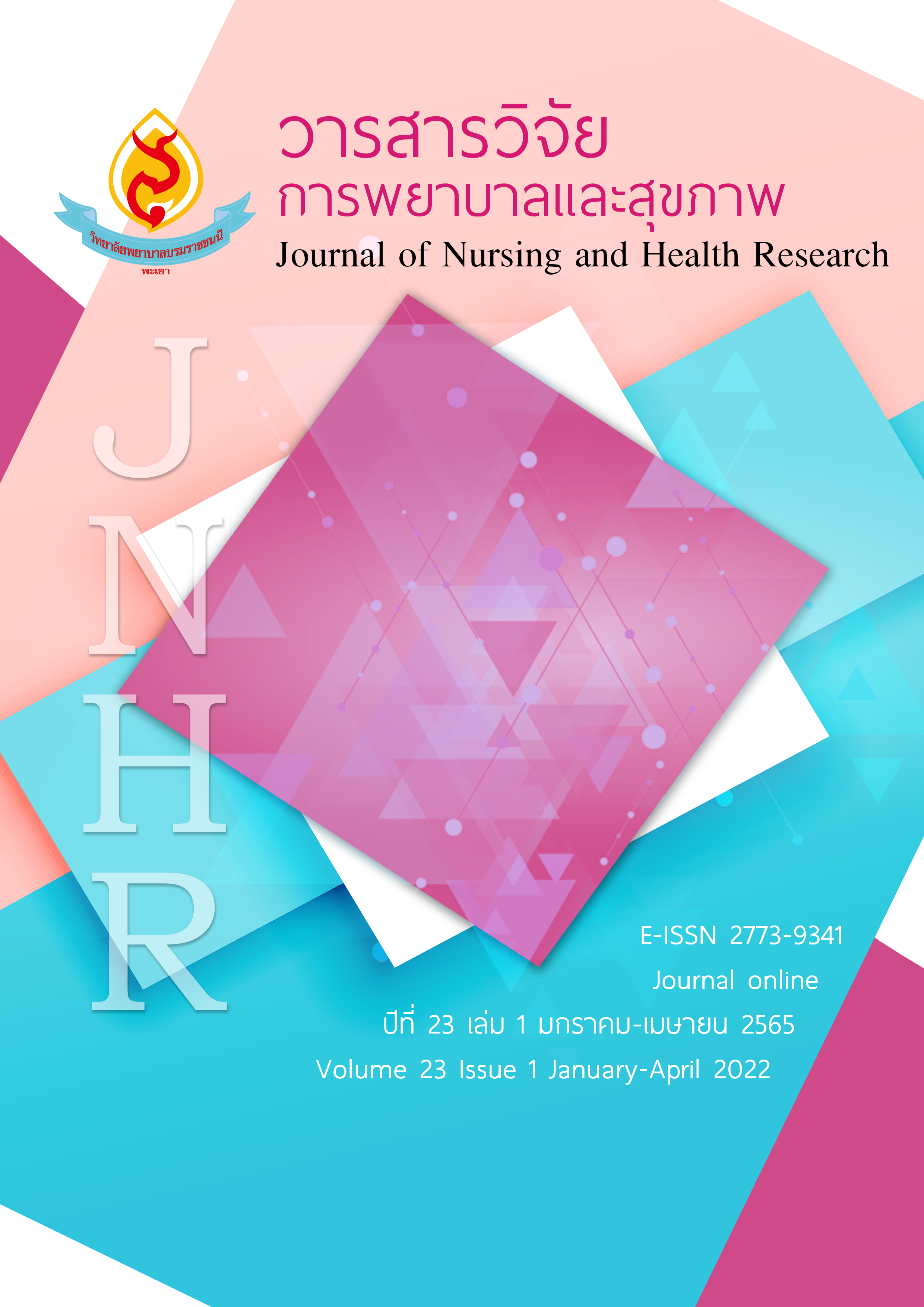ประสิทธิผลของเจลน้ำมันสมุนไพรต่อความเครียดและการผ่อนคลายในผู้สูงอายุ
คำสำคัญ:
เจลน้ำมันสมุนไพร, ความเครียด, การผ่อนคลาย, ผู้สูงอายุบทคัดย่อ
การวิจัยนี้เป็นการวิจัยแบบกึ่งทดลอง (two group pretest-posttest design) มีวัตถุประสงค์เพื่อศึกษาประสิทธิผลของเจลน้ำมันสมุนไพรต่อความเครียดและการผ่อนคลาย เก็บข้อมูลในการทดลองจากกลุ่มตัวอย่าง จำนวน 40 คน และสุ่มอย่างง่าย เข้ากลุ่มกลุ่มทดลองและ กลุ่มควบคุม กลุ่มละ 20 คน กลุ่มทดลองได้รับเจลน้ำมันสมุนไพร ส่วนกลุ่มควบคุมได้รับยาหลอก ระยะเวลาในการทดลอง 1 สัปดาห์ วัดผลด้วยแบบประเมินความเครียด (ST-5) แบบประเมินการผ่อนคลายชนิดเปรียบเทียบโดยสายตา (visual analogue scale) อัตราการเต้นของหัวใจ อัตราการหายใจ และความดันโลหิต เปรียบเทียบก่อนและหลังการทดลอง โดยใช้สถิติ paired t-test และ independent t-test ผลการวิจัยพบว่า ผลประเมินความเครียด ประเมินการผ่อนคลายชนิดเปรียบเทียบโดยสายตา อัตราการหายใจและความดันโลหิตซิสโตลิคหลังการทดลองระหว่างกลุ่มทดลองและกลุ่มควบคุมแตกต่างกันอย่างมีนัยสำคัญทางสถิติที่ (p<.01) ส่วนอัตราการเต้นของหัวใจและความดันโลหิตไดแอสโตลิคไม่มีความแตกต่างกัน ผลการทดลองนี้แสดงให้เห็นว่าเจลน้ำมันสมุนไพรสามารถลดความเครียดและช่วยให้เกิดการผ่อนคลายได้ จึงเป็นทางเลือกหนึ่งในการนำมาใช้ดูแลผู้สูงอายุที่มีปัญหาความเครียดได้
เอกสารอ้างอิง
กรมสุขภาพจิต กระทรวงสาธารณสุข. (2561). สถิติผู้สูงอายุฆ่าตัวตายสูงอันดับ 2 (ข่าวจากหนังสือพิมพ์ที่เกี่ยวข้องกับสุขภาพจิต). สืบค้นเมื่อ 10 ตุลาคม 2562, จาก https://dmh.go.th/news-dmh/view.asp?id=27623.
กรมสุขภาพจิต กระทรวงสาธารณสุข. (2561ก). รายงานประจำปีกรมสุขภาพจิต ปีงบประมาณ 2561 (รายงานประจำปี). กรุงเทพฯ:ละม่อมจำกัด.
กรมอนามัย. (2563). แบบรายงานการตรวจราชการกระทรวงสาธารณสุขประจำปีงบประมาณ พ.ศ.2563 ประเด็นที่ 3 สุขภาพกลุ่มวัย หัวข้อ ผู้สูงอายุคุณภาพ เขตสุขภาพที่ 6 จังหวัดฉะเชิงเทรา. สืบค้นเมื่อ 8 ตุลาคม 2563, จาก https://hpc6.anamai.moph.go.th/th/inspection63-2.
ก้าวเกียรติ สุมิตรเหมาะ, ชัชพงค์ สุขสราญ, เมธิรา คำทอง นิบุณ, วัฒนญาณนนท์ วรางคณา, และ อาภรณ์ชยานนท์. (2563). ความสัมพันธ์เบื้องต้นของการใช้สุคนธบำบัดชนิดสูดดมเป็นประจำต่ออารมณ์และความดันโลหิตในอาสาสมัครชายสุขภาพดี. วารสารกรมการแพทย์แผนไทยและการแพทย์ทางเลือก, 18(2)(ฉบับเสริม), 36.
จีรวัฒน์ เก้ารัตน์. (2558). ผลของการจัดสิ่งแวดล้อมเพื่อผ่อนคลายผู้รับบริการที่มีภาวะความดันโลหิตสูงขณะรอตรวจที่แผนกผู้ป่วยนอกโรงพยาบาลสอง จังหวัดแพร่. สืบค้นเมื่อ 10 กรกฎาคม 2564. จาก http://www. r2rthailand.org/sites/default/files/example2.pdf
ญาดา เรียมริมมะดัน และอรชุมา หนูน้อย. (2564). การพัฒนาเจลน้ำมันสมุนไพรต่อการผ่อนคลายความเครียดในผู้สูงอายุ (รายงานผลการวิจัย). ฉะเชิงเทรา: มหาวิทยาลัยราชภัฏราชนครินทร์.
ชนิดา โรจน์จำนงค์, อรรถพล สุคนธาภิรมย์ ณ พัทลุง, และภัทราภรณ์ กินร. (2563). ผลของสุคนธบำบัดต่อความฝันที่เกี่ยวกับสารเสพติด:ความรู้สึก 9 ด้านและคุณภาพการนอนหลับในผู้ป่วยใช้สารแอมเฟตามีน. Chula longkorn Medical Bulletin, 2(1), 3-14.
ดุษฎี อุดมอิทธิพงศ์, กฤตนัย แก้วยศ, และเกยูรมาศ อยู่ถิ่น. (2561). น้ำมันหอมระเหยกับการทำงานของระบบประสาทและความรู้สึกทางอารมณ์. วารสารสถาบันจิตเวชศาสตร์สมเด็จเจ้าพระยา, 12(2), 48-62.
ธวัชชัย ศรีสุวรรณ, จุฬารัตน์ สมคุณ, และธัญชนก ชูเสือหึง. (2561). ผลต่อความผ่อนคลายของน้ำมันหอมระเหยจากใบสมุลแว้งในอาสาสมัครสุขภาพดี. วารสารมหาวิทยาลัยทักษิณ, 21(2), 1-10.
พรพรรณ ศรีโสภา และธนวรรณ อาษารัฐ. (2560). บทบาทพยาบาลในการป้องกันและจัดการความเครียด. บูรพาเวชสาร, 4(2), 79-92.
พีรสันต์ ปั้นก้อง. (2560). ภาวะสุขภาพของผู้สูงอายุ อำเภอตรอน จังหวัดอุตรดิตถ์. วารสารกรมการแพทย์,42(6), 119-123.
ศราวุฒิ แพะขุนทด, ศุภะลักษณ์ ฟักคำ, วินัย สยอวรรณ, และนภชา สิงห์วีรธรรม. (2565). ผลของการสูดดมกลิ่นน้ำมันหอมระเหยขมิ้นชันต่อระบบประสาทอัตโนมัติและอารมณ์ความรู้สึก. วารสารเครือข่ายวิทยาลัยพยาบาลและการสาธารณสุขภาคใต้, 9(1), 257-269.
สุธัญญา พรหมสมบูรณ์, อนงค์นาฏ โสภณางกูร, ประพฤติ พรหมสมบูรณ์, และสุชาดา กรเพชรปาณี.(2560). ประสิทธิภาพของน้ำมันหอมระเหยจากพืชสมุนไพร 5 ชนิด ต่อการผ่อนคลายความเครียด. วารสารวิจัย, 10(2), 68-76.
สำนักวิชาการ สำนักงานเลขาธิการสภาผู้แทนราษฎร. (2561). สังคมผู้สูงอายุกับการขับเคลื่อนเศรษฐกิจไทย. จาก https://dl.parliament.go.th/handle/lirt/518445
สถาบันวิจัยประชากรและสังคม. (2562). ประชากรของประเทศไทย พ.ศ.2562. สารประชากรมหาวิทยาลัยมหิดล. สืบค้นเมื่อ 12 ตุลาคม 2562. จาก https://ipsr.mahidol.ac.th/ipsrbeta/th/Gazette.aspx.
สถาบันวิจัยระบบสาธารณสุข. (2557). ยาคลายเครียดเรื่องซีเรียสที่ต้องระวัง. สืบค้นเมื่อ 20 ตุลาคม 2562. จาก https://www.hsri.or.th/people/media/infographic/detail/5002.
สถาบันวิจัยและพัฒนาผู้สูงอายุไทย. (2560). สถานการณ์ผู้สูงอายุไทย พ.ศ. 2559. กรุงเทพฯ: พริ้นเทอรี่.
อรวรรณ ศิลปกิจ. (2551). แบบวัดความเครียดฉบับศรีธัญญา. วารสารสุขภาพจิตแห่งประเทศไทย, 16(3), 177-185.
อ้อมบุญ วัลลิสุต. (2557). อโรมาเธอราพี (Aromatherapy). สืบค้นเมื่อ 20 ตุลาคม 2562. จาก https:// pharmacy.mahidol.ac.th/knowledge/files/0225.pdf
Cohen, J. (1988). Statistical Power Analysis for the Behavioral Science (2 nd ed). Hillsdale, NJ: Lawrence Earlbaum Associa.
Linck, V.M., Silva, A.L., da, Figueiro, M., Caramao, E.B., Moreno, P.R., & Elisabetsky, E. (2010). Effects of inhaled linalool in anxiety, social interaction and aggressive behavior in mice. Phytomedicine, 17(8-9), 679-683. doi: 10.1016/j.phymed.2009.10.002
Pimenta, F., Alves, M., Pimenta, M., Melo, S., Almeida, A., Leite, J.R.,…de Almeida, R.N. (2016). Anxiolytic effect of Citrus aurantium L. on patients with chronic myeloid leukemia. Phytotherapy Research, 30(4), 613-7. doi: 10.1002/ptr.5566
Rashidi-Fakari, F., Tabatabaeichehr, M., & Mortazavi, H. (2015). The effect of aromatherapy by Essential oil of orange on anxiety during labor: A randomized clinical trial. Iranian Journal of Nursing and Midwifery Research, 20(6), 661–664. doi: 10.4103/1735-9066.170001
ดาวน์โหลด
เผยแพร่แล้ว
รูปแบบการอ้างอิง
ฉบับ
ประเภทบทความ
สัญญาอนุญาต
ลิขสิทธิ์ (c) 2022 วารสารวิจัยการพยาบาลและสุขภาพ

อนุญาตภายใต้เงื่อนไข Creative Commons Attribution-NonCommercial-NoDerivatives 4.0 International License.



